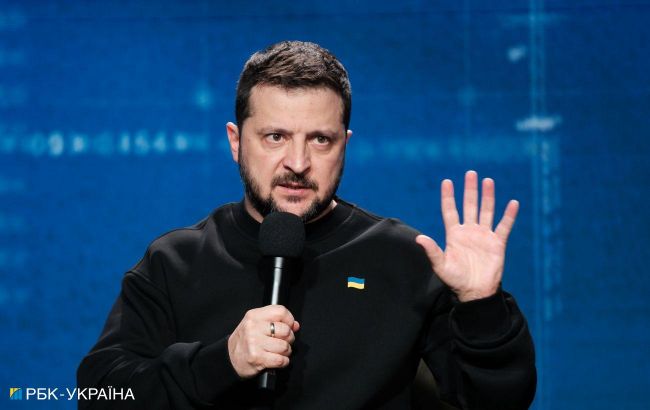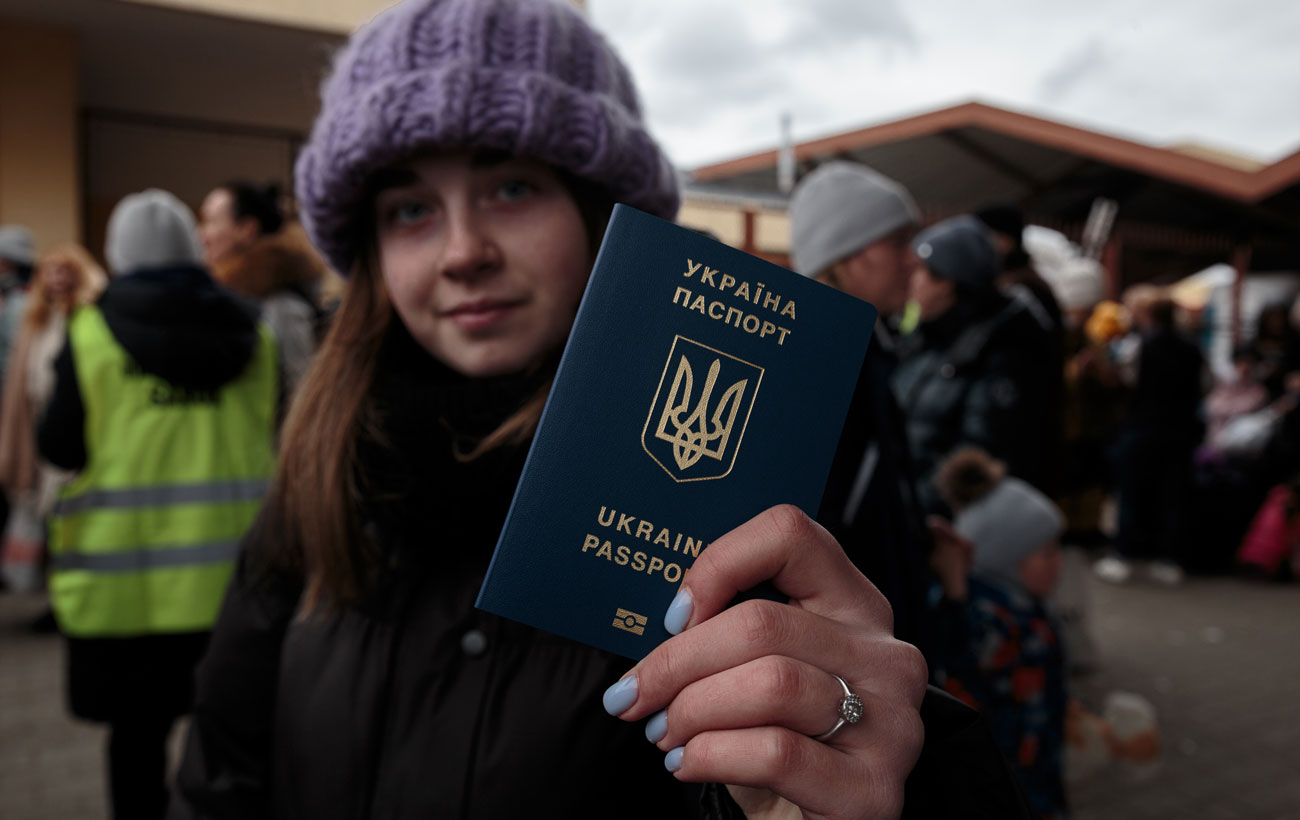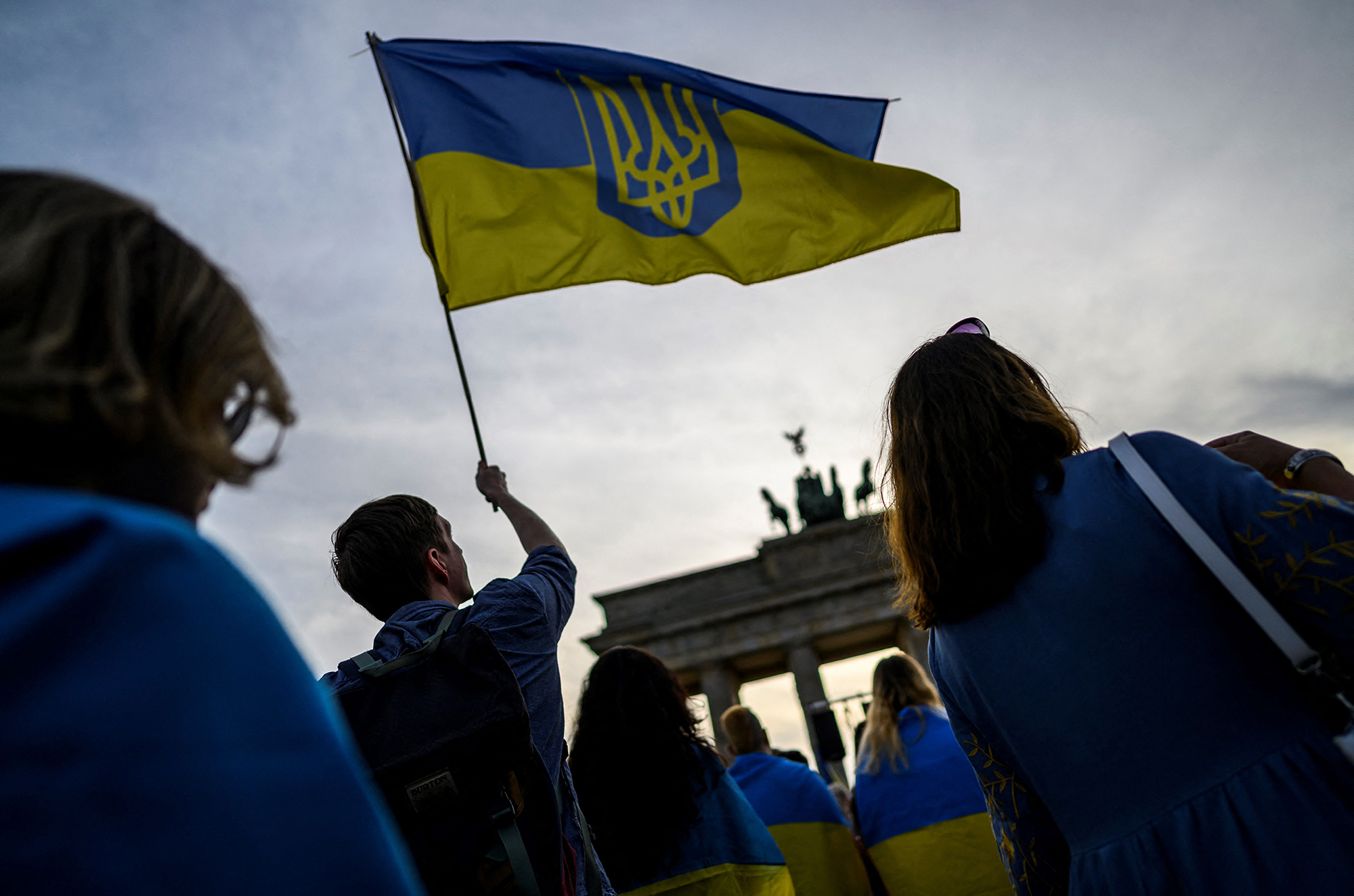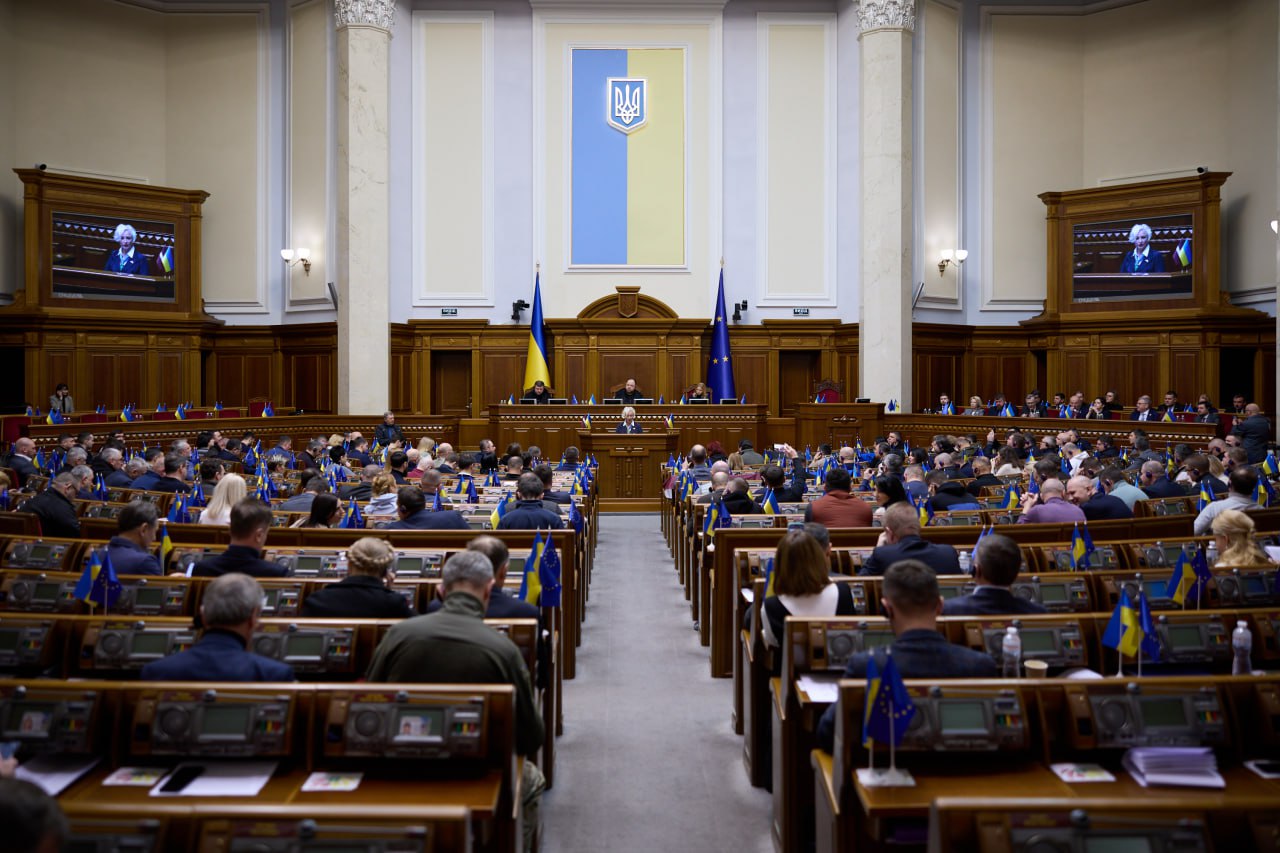Zelenskyy proposes dual citizenship: How it will work and what it means for Ukraine
 Photo: President of Ukraine, Volodymyr Zelenskyy (Vitalii Nosach, RBC-Ukraine)
Photo: President of Ukraine, Volodymyr Zelenskyy (Vitalii Nosach, RBC-Ukraine)
The initiative of introducing dual citizenship in Ukraine by President Zelenskyy, its potential conflict with the Constitution, its impact on the diaspora, foreign volunteers, and Ukrainian refugees abroad, as well as its prospects for approval by the Verkhovna Rada, are detailed in an article by RBC-Ukraine.
The article, drawing on data from the Verkhovna Rada of Ukraine website, includes insights from legal expert Anna Zhakot of Nota Group, the head of the migration research department at the Ptoukha Institute for Demography and Social Studies of the National Academy of Sciences of Ukraine Oleksiy Poznyak, the president of the Kyiv International Institute of Sociology Volodymyr Paniotto, and off-record comments from sources within the Servant of the People faction.
President Zelenskyy first mentioned granting Ukrainian citizenship to "all Ukrainians on the planet" who wish to return to their historical homeland in his inaugural speech in May 2019. Essentially, this implied the legalization of dual (multiple) citizenship, which many legal experts believed could contradict the Constitution.
Within six months, Zelenskyy introduced the corresponding bill to the Verkhovna Rada. Although Parliament took it up in early 2020, the matter never reached the consideration stage, not even in the first reading.
As explained by sources in the Servant of the People party to RBC-Ukraine, there were not enough votes in the session hall to support the decision at that time. Moreover, part of the opposition sought clarification from the Constitutional Court regarding the provisions of Ukraine's sole citizenship.
The next attempt to address the issue of dual citizenship occurred at the end of 2021. However, this bill also failed to reach the parliamentary floor due to Russia's full-scale invasion.
Finally, on Monday, January 22, in his greetings on the occasion of Ukraine's Unity Day, Zelenskyy announced the introduction of another new bill (No. 10425), which aims to officially implement dual citizenship in Ukraine. According to the president, this initiative will primarily concern the numerous Ukrainian diaspora worldwide and foreign volunteers currently defending Ukraine against Russian aggression.
"Back in 2020, it was just one of our many initiatives, considering the circumstances. Now, with millions of Ukrainians forced to leave, the issue has become more urgent. Plus, it's a response to Russia's active passportization, significantly intensified in the occupied territories," said the source from Servant of the People. They also acknowledged that such a step carries a symbolic significance.
White list
RBC-Ukraine has thoroughly analyzed the key provisions of the presidential bill. In brief, its essence boils down to the fact that passport holders of other countries will not need to renounce them to become citizens of Ukraine, as currently mandated. However, this provision applies only to citizens of countries on a conditional "white list," which includes all EU member states, as well as the United Kingdom, Norway, Switzerland, the United States, Canada, and Japan. The presence of a specific list of "friendly countries" distinguishes the current presidential bill from previous counterparts, although its concept has remained unchanged since 2019.

Photo: Getty Images
Another crucial point is that obtaining a passport from countries on the "white list" will no longer be grounds for losing Ukrainian citizenship, as it currently stands. However, in practice, this provision has never fully functioned, allowing a significant number of Ukrainians to obtain Hungarian, Romanian, and Russian passports even before the full-scale war. Voluntarily obtaining a Russian passport is explicitly highlighted as a reason for losing Ukrainian citizenship (though this does not apply to forced passportization by occupiers).
The key provision of the bill states that if any individual, aside from being Ukrainian, holds citizenship in another country, in legal relations with the state, they will be recognized solely as a citizen of Ukraine. This applies to both foreigners who have acquired Ukrainian citizenship and Ukrainian citizens who have acquired the citizenship of another country. Therefore, a Ukrainian passport holder must fulfill all legal obligations to Ukraine (such as being subject to mobilization), and the possession of another citizenship will not change this.
Meanwhile, Ukrainians who permanently reside in the country can acquire the citizenship of another country if permitted by the laws of that state. However, voluntarily renouncing Ukrainian citizenship (e.g., to relieve oneself of certain obligations to the state) is only possible for Ukrainians who permanently reside abroad, as stipulated by existing legislation.
Constitutional issue
During future discussions on the presidential bill, the central focus, as before, will be on whether it violates the constitutional norm of having a single citizenship in Ukraine. Differences in expert interpretations of this during a unified telethon were acknowledged by the Parliamentary Commissioner for Human Rights, Dmytro Lubinets.
According to the lawyer from Nota Group, Anna Zhakot, the current bill differs mainly by eliminating the collision with constitutional norms. In previous initiatives, the main obstacle was precisely such a contradiction – the proposed norms then required changes to the Constitution. In the case of adopting the current bill, amendments to the Basic Law will not be necessary, she assures.
"Bill No. 10425 is written specifically to bypass this controversy. And through the formulations, unify legislation. The bill proposed by the president establishes the principle of a single citizenship as one of the principles of Ukraine's citizenship legislation. It aims to align with Article 4 of the Constitution, which stipulates that Ukraine has only one citizenship – Ukrainian," explains the expert. According to Zhakot, this will not contradict the legislatively established negative attitude towards dual/multiple citizenship.
According to the Nota Group lawyer, there is a risk that, in practice, multiple legislation in Ukraine may emerge, although it will not be called that. However, much will depend on subsequent readings and edits, as changes may be made, she notes.
In Zhakot's opinion, although Bill No. 10425 currently has some shortcomings and technical inaccuracies, these can be addressed in subsequent revisions and readings.
Connection with Ukraine
Factors such as the possibility of multiple citizenship would allow people abroad to maintain cultural and mental ties with Ukraine. Therefore, the legislative initiative will have a positive impact in the long run, expresses the opinion in a conversation with RBC-Ukraine, Oleksiy Poznyak, Ph.D. in Economics, head of the migration research department at the Ptukha Institute of Demography and Social Studies of the NAS of Ukraine.

Ukrainians in Berlin (Photo: Getty Images)
"It's a kind of signal that as a country, we are not breaking ties with our compatriots who have emigrated abroad and have been living there for a long time. After leaving, they could already acquire the citizenship of other countries, and now they will have the opportunity to retain both Ukrainian citizenship if such a bill is adopted. The initiative is designed to make people feel that they are not strangers in Ukraine. And, of course, this is a positive aspect," says the expert.
According to the State Border Guard Service, since the beginning of the full-scale war, 2.4 million Ukrainians have emigrated and not returned. The UN cites significantly higher figures, counting 6.24 million Ukrainian refugees currently residing abroad. However, Oleksiy Poznyak believes that refugees are not the "target audience" for the idea of multiple citizenship because there is no tendency among those who have left to renounce their Ukrainian passports.
"The law is aimed more at long-term labor migrants and representatives of our diaspora who have been living abroad for a long time. But not necessarily those who want to move to Ukraine. Perhaps some of the children of diaspora members will express a desire to work here after the war. The bill is intended to simplify such procedures," emphasizes the source.
Bill No. 10425 is also designed for foreign volunteers currently serving in the Armed Forces of Ukraine. "The acquisition of Ukrainian citizenship could be of interest to some of the legionnaires who are currently defending Ukraine, especially those from economically poorer countries than rich ones. For them, it could also be a significant attribute. However, a lot will depend on the situation in post-war Ukraine, how its revival and reconstruction will go, and what will happen with the economy," notes Poznyak.
What makes the idea of multiple citizenship interesting is that even when living abroad, people could actively participate in all processes happening in Ukraine, according to Vladimir Paniotto, the president of the Kyiv International Institute of Sociology and a professor at Kyiv-Mohyla Academy.
"Some will work remotely in Ukraine, some will send money. Someone's children may want to study at Ukrainian universities. But in one way or another, they will be able to influence processes beneficial to Ukraine abroad. They can propose initiatives, influence local public opinion where they live. Ukrainians in Canada and Germany already do this. There, Ukrainians significantly impact the decisions made by those countries. Holders of Ukrainian passports will promote our interests abroad," he believes.
However, the sociologist is convinced that this law will not solve the demographic crisis caused by the war in Ukraine.
"It is unlikely that they will return in such numbers to solve this problem. Each subsequent month of the war is not in our favor. From April 2022 to April 2023, that is, within a year, 75% of Ukrainians were willing to return to Ukraine. Later, this number dropped to only 50%. So at least half will not return. Nevertheless, having citizenship will allow them to maintain ties with Ukraine. Therefore, in a strategic dimension, it will definitely be beneficial," says Paniotto.

Approving the draft law on citizenship by the Verkhovna Rada will not be easy (photo: https://t.me/verkhovnaradaukrainy)
According to a source in the "Servant of the People" faction, the key objectives of the bill are to actively involve the Ukrainian diaspora in assisting and rebuilding Ukraine and to create a clear legal framework for bipatrides who have already acquired another citizenship, so they won't have to hide this fact from the Ukrainian state.
Additionally, there are plans to create a special investment regime for them in Ukraine, within the framework of post-war recovery, under the conditional "semi-resident status."
"The overall goal is for our diaspora to become as influential as, say, the Irish or Armenian diaspora," says the source.
However, in practice, this is still a very long road. The first stage is to pass the bill through the Verkhovna Rada, which, according to sources, will be quite challenging. In particular, the opposition, as four years ago, will actively push the theme of the bill violating the Constitution regarding single citizenship. It is evident that votes will be found for the first reading, but for the final adoption of the bill, they will need to be actively sought. Therefore, despite the urgent status of the bill, the timeline for its final adoption is currently unclear.

